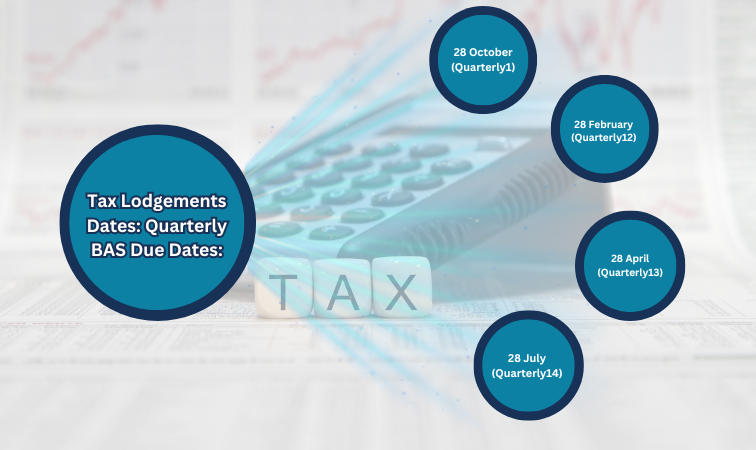
GET A FREE CONSULTATION TODAY!
Fill in the details, and our experts will contact you.
Self-managed super funds (SMSFs) give people full control over their retirement savings, enabling them to create investment strategies based on personal financial goals. SMSF trustees have the freedom to select their investments from a range of shares, property, and other possible assets beyond retail and industry super funds. Because of their increased decision-making power, SMSF trustees need to actively maintain strict compliance and reporting responsibilities toward the Australian Taxation Office (ATO).
SMSF managers must pay strict attention to essential lodgement dates to comply with Australian Taxation Office requirements. Missing these tax lodgement deadlines can result in heavy penalties, additional tax liabilities, and even the loss of the fund’s concessional tax treatment.
Trusting managers must maintain knowledge of their SMSF requirements, including annual return lodgement due dates, auditing standards, pension payment deadlines, and tax compliance, to prevent disqualification of their funds.
One essential part of SMSF management includes completing annual returns while handling contributions and pension payments and complying with lodgement requirements. Here is the comprehensive list of SMSF due dates:
The SMSF Annual Return (SAR) demands reporting of financial data combined with income statements and deductions alongside regulatory requirements of the fund.
Annual Return Lodgment Due Date for New SMSFs: New SMSF organisations must lodge their first Annual Return on February 28th of the subsequent financial year when the fund becomes established during that year.
Annual Return Lodgment Due Date for Existing SMSFs: If tax professionals file the documents, SMSF trustees must submit their annual returns on 15 May. However, the deadline shifts to 31 October when the fund submits its returns independently.
Late Lodgement Consequences: Failure to lodge on time will lead to penalties coupled with audit risk and may trigger removing the fund’s compliance status.
2. SMSF Audit Deadline
Every Single-Member Superannuation Fund (SMSF) must undergo an audit before submitting its annual return.
Audit Completion Deadline: SMSF audits must be completed before the self-managed super fund's annual return needs to be submitted.
Trustee Responsibility: Trustees are responsible for delivering financial records to their auditing service before the submission deadline.
Penalty for Non-Compliance: A delayed audit can lead to a postponed SAR submission, resulting in potential administrative fines.
Independent contractors making superannuation guarantee (SG) contributions to SMSFs for employee members must meet specific SG deadline requirements.
Quarterly Due Dates:
28 January (for the October – December quarter)
28 April (for the January – March quarter)
28 July (for April – June quarter)
28 October (for the July – September quarter)
Late Contributions: Late submissions cause financial penalties and compel organisations to file Superannuation Guarantee Charge (SGC) statements.
SMSFs need to withdraw their minimum pension payments before the financial year's 30 June date when they provide retirement income streams (pensions) to their members.
Pension income taxation at superannuation tax rates will be triggered if an SMSF fails to meet its required withdrawal amount.
Where an SMSF has taxable income for which Pay-As-You-Go (PAYG) instalments are due or for which it is registered for GST, lodgement due dates apply:
Tax Lodgements Dates: Quarterly BAS Due Dates:
28 October (Q1)
28 February (Q2)
28 April (Q3)
28 July (Q4)
PAYG Instalments: Due quarterly according to ATO schedule.
Tax Lodgement Due Date for SMSFs: The normal due date for lodging SMSF tax returns is 15 May if lodged by a registered tax agent. But if the SMSF is newly registered, the due date could be sooner (28 February).
Delay in Lodging: A delay in lodgement can lead to penalties and loss of concession tax treatment.

If the SMSF has a registered tax agent, there may be lodgement extensions:
15 May Extension: Most SMSFs that lodge with a tax agent have until 15 May of the next financial year.
To guarantee compliance with every due date, SMSF trustees should:
Maintain Detailed Financial Records: Monitor all contributions, investments, expenses, and tax documents to be able to report accurately.
Engage a Registered SMSF Auditor Early: Hiring an auditor ahead of time avoids last-minute rushes and guarantees compliance with ATO rules.
Use a Tax Agent for Lodgement: Professional tax agents can assist with lodgement responsibilities, understand intricate tax requirements, and obtain deadline extensions.
Automate Contributions & Pension Payments: Direct deposits or reminders can avoid missed tax lodgement deadlines and non-compliance problems.
Stay Updated on Regulatory Changes: The ATO regularly updates SMSF rules, so trustees should frequently check ATO guidance or seek the advice of a professional.
Utilise an SMSF Compliance Calendar: Monitoring due dates in a calendar can avoid oversights and provide timely lodgement of necessary reports.
Periodic Review of Fund Investment Strategy: Trustees must make sure that their fund's investment strategy is compatible with ATO compliance requirements and risk tolerance.
SMSF management is difficult and time-consuming. Aone Outsourcing Solutions provides specialised SMSF administration and compliance services to make sure your fund complies with all legislation. Our services are as follows:
SMSF Annual Return Preparation & Lodgement
Independent SMSF Audit Coordination
Super Contribution & Pension Payment Tracking
ATO Compliance & Regulatory Updates
BAS & PAYG Lodgements
By partnering with Aone Outsourcing Solutions, SMSF trustees can build their superannuation reserves while we resolve compliance issues and administrative matters. Call us today to learn how we can help you with your SMSF management requirements!